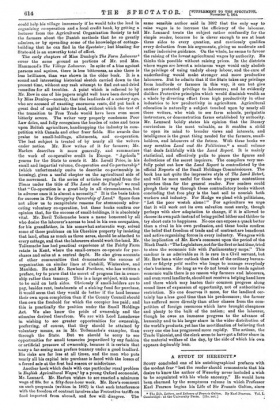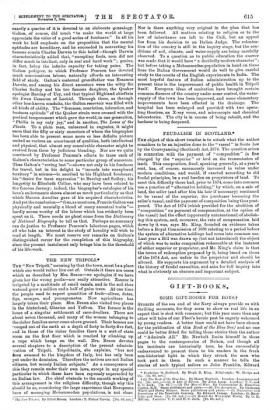A STUDY IN HBREDITY.* Scorr concluded one of his autobiographical
prefaces with the modest fear "lest the reader should remonstrate that bin desire to know the author of Waverley never included a wish to be acquainted with his whole ancestry," He would have been eliiirmed by the sumptuous volume in which Professor Karl Pearson begins his Life of Sir Francis Galton, since The Life, Lettere, cold Labours of Francis Genoa. By Earl Pearson. Vol. L Cambridge: at the University Press. 121s. net.]
exactly a quarter of it is devoted to an elaborate genealogy. Galton, of course, did much "to make the world at large appreciate the value of a good series of forebears." In all his work he laid emphasis on the proposition that the mental aptitudes are hereditary, and he succeeded in converting his famous cousin Charles Darwin to this belief—though Darwin characteristically added that, "excepting fools, men did not differ much in intellect, only in zeal and hard work"; genius, in fact, being the infinite capacity for taking pains. The Gallon pedigree, to which Professor Pearson has devoted much conscientious labour, naturally affords an interesting field of study. Gallon's maternal grandfather was Erasmus Darwin, and among his direct ancestors were the witty Sir Charles Sedley and his too famous daughter, the Quaker apologist Barclay of Ury, and that typical Highland chieftain Sir Ewen Cameron of Lochiel. Through these, as through other less-known conduits, the Galton reservoir was filled with all kinds of ability. The "firmness, conviction, toleration, and business aptitude" of the Quaker strain were crossed with the poetical temperament which gave the world, in one generation, " Phillis is my only joy," and in another, The Loves of the Plants. To a plain man, unlearned in eugenics, it might seem that the fifty or sixty ancestors of whom the biographer has been able to present some more or less definite picture united so various an assortment of qualities, both intellectual and physical, that almost any conceivable character might be evolved from them by judicious blending. Nor are we quite convinced by Professor Peareon's efforts to trace each of Galton's characteristics to some particular group of ancestors. Thus Gallon's "roving lust "—shown not only in his fondness for travel, but in his delight in "inroads into unexplored territory" in science—is ascribed to his Highland forebears ; his "desire for terse expression" to Barclay and Sedley ; his longevity to Elizabeth Collier, who may have been related to the famous Jeremy; indeed, the biographer's catalogue of his hero's endowments shows almost as much particularity as that which Marcus Aurelius gave of his acquired characteristics. And yet the conclusion—" thus, as most men, Francis Gallon was physically and mentally a blend of many ancestral traits "- hardly seems worthy of the labour which has evidently been spent on it. There needs no ghost come from the Dictionary of National Biography to tell us that. Perhaps no summary can do justice to Professor Pearson's laborious pages, which all who take an interest in the study of heredity will wish to read at length. We must reserve our remarks on Gallon's distinguished career for the completion of this biography, since the present instalment only brings him to the threshold of his life-work.















































 Previous page
Previous page